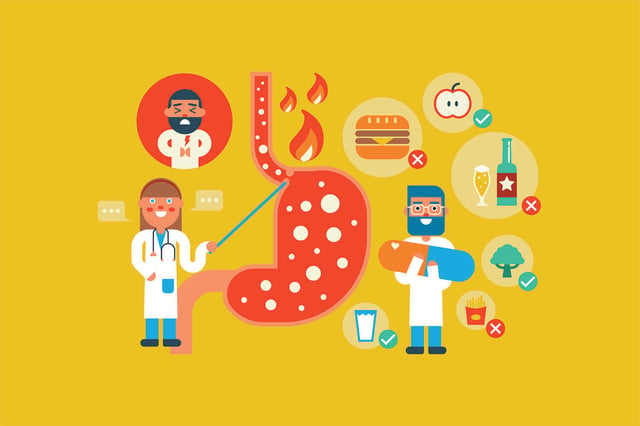Do you suffer from chronic stomach and chest discomfort? It may be GERD.
What is GERD?
Gastroesophageal reflux disease. Chronic acid reflux which involves frequent heartburn and other uncomfortable complications.
What is acid reflux?
When someone swallows, the lower esophageal sphincter relaxes to allow food to flow down into your stomach, it then closes again. With acid reflux, this sphincter relaxes abnormally causing stomach acid to move up the esophagus as opposed to staying in the stomach. If this valve consistently relaxes abnormally, heart burn and GERD can occur.
Additional complications with GERD:
- Sour taste in your mouth
- Difficulty swallowing
- Burning in your chest or throat
- Regurgitation
- Feeling like you have a lump in your throat
- Dry cough
- Sore throat
- Heartburn pain
- In extreme cases chronic acid reflux can cause the esophagus to bleed and narrow
- If untreated, risk of cancer is increased
You may have a higher risk for GERD if:
- You are overweight or obese
- You are pregnant
- You have diabetes
- You are a smoker
- You have asthma
- You struggle with dry mouth

The good news:
Lifestyle changes can alleviate GERD in most cases. Try these tips to relieve symptoms:
- Avoid foods that trigger heart burn or GERD
According to the International Foundation for Functional Gastrointestinal Disorders (IFFGD), diet and lifestyle changes should begin with identifying triggers that worsen symptoms. Examples of things that commonly trigger symptoms are:
- High-fat foods
- Spicy foods
- Caffeine
- Chocolate
- Peppermint
- Citrus and tomato products
Different people will have different triggers. Keeping a food journal will be very helpful in identifying these triggers. Record what you eat and when you eat it, then record how you felt after eating. Sometimes foods may have a delayed reaction, so keep that in mind as you record reactions. Avoid laying down right after eating, as this may also trigger reflux. Once you have identified triggers, plan your meals around what you can eat.
- Avoid carbonated beverages
Carbonation in beverages such as soda can cause the stomach to become distended. Increased pressure in the stomach puts pressure on the lower esophageal sphincter increasing the risk for reflux. Carbonated beverages often have high levels of acidity, which could also contribute to acid reflux. In addition, many carbonated beverages contain caffeine which may further exacerbate symptoms. - Avoid alcohol
Alcohol, particularly red wine, may worsen symptoms of GERD. NPR’s Kevin Ghassemi, a gastroenterologist at the Ronald Regan UCLA medical center, explains it this way: “The lower esophageal sphincter — located at the junction between the stomach and the esophagus is supposed to be closed, except when food is passing into the esophagus, but alcohol can relax the sphincter muscle and create an opening. When this happens, stomach acid ‘can come back up into the esophagus, and that’s reflux.’ If you include alcohol in your diet, do so in moderation to reduce symptoms.” - Lose excess weight
Excess weight is associated with higher rates of GERD. According to the Obesity Action Coalition, the increased risk of GERD is thought to be due to excess belly fat causing pressure on the stomach. - Consider your sleep
According to IFFGD you may find a decrease in symptoms if you:
- Stick to a sleep routine
- Don’t take naps after 3pm
- Participate in relaxing activities before bed so that you are ready to sleep once you lie down. Lying awake in bed can make symptoms worse
- Don’t eat 2-3 hours before bed
- If you must eat close to bedtime, stick to a small meal and try raising the head of the bed 6-8 inches to reduce reflux
- Create a sleep environment
If GERD is getting in the way of living a full happy life, focus on what you can control and start making changes today. If symptoms do not improve, schedule an appointment with your doctor.
Check out our Wellness Library for more health information and to take our Healthy Lifestyle Assessment.






